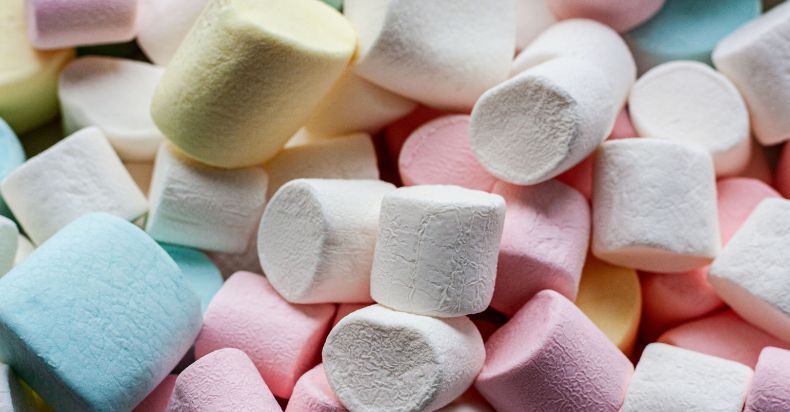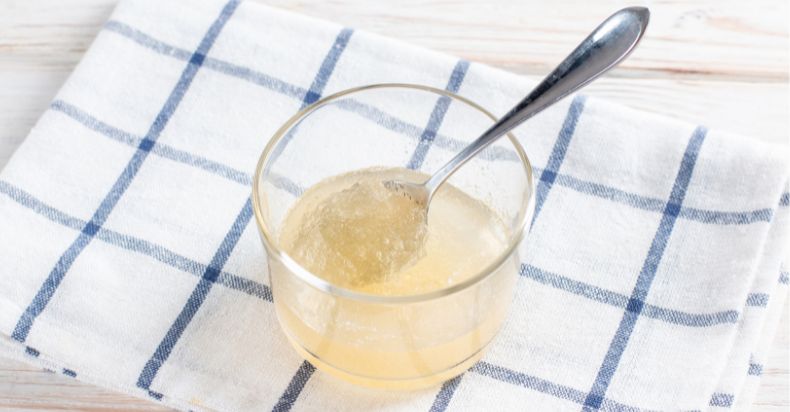Marshmallows, those fluffy, cloud-like confections, have delighted taste buds for centuries. Originating from ancient Egypt, these sweet treats were initially made from the root sap of the marshmallow plant, combined with honey.
It was a delicacy savored by royalty and the gods. Fast forward to modern times, and marshmallows have evolved in composition and production but remain a favorite treat worldwide.
But a lingering question for many is: do marshmallows have pork? Let’s find out.
Do Marshmallows Have Pork?
Yes, many commercially produced marshmallows contain gelatin, which is often derived from pork.
However, there are vegetarian and vegan marshmallow alternatives available that do not contain pork or any animal-derived ingredients.
Always check the ingredient list or look for specific certifications (like Vegan or Halal) to determine the source of gelatin in marshmallows.
History of Marshmallows

The word “marshmallow” comes from the mallow plant species (Althaea officinalis), a herb native to parts of Europe, North Africa, and Asia.
The plant’s root has been used since ancient Egyptian times, both for its medicinal properties and as a base for a sweet treat when mixed with honey and nuts.
By the 19th century, confectioners in France began whipping up the plant’s sap with egg whites and sugar, creating a fluffy candy that soon gained popularity.
However, extracting the sap was labor-intensive, leading to the search for alternatives.
With the industrial revolution and advancements in food processing, gelatin (a protein derived from animal collagen) replaced the mallow root sap.
This change made mass production feasible and brought marshmallows to the masses.
Today’s marshmallows, found in supermarkets, are a far cry from their ancient counterparts but still hold a special place in our hearts and cultures.
Cultural Significance of Marshmallows
From the campfires of North America to the hot chocolate cups of Europe, marshmallows have become a symbol of comfort and nostalgia.
They’re integral to certain celebrations, like the U.S.’s National S’mores Day, where marshmallows are sandwiched with chocolate between graham crackers.
In other cultures, marshmallows have different variations and significance but are cherished nonetheless.
With this rich history and cultural backdrop, the composition of marshmallows becomes even more intriguing.
As we proceed, we’ll uncover the truth about the presence of pork in these beloved treats and explore alternatives for those with dietary restrictions.
The Main Components of Marshmallows

Marshmallows, in their simplest form, are a combination of sugar, water, air, and a gelling agent.
These ingredients, when combined in specific proportions and processed correctly, result in the fluffy, spongy treats we adore. Let’s break down these components:
Sugar: The Sweet Backbone
Sugar is the primary ingredient in marshmallows, giving them their sweet taste. Historically, honey was the sweetener of choice, especially in ancient Egyptian marshmallows.
Today, most commercial marshmallows use corn syrup or sucrose.
- Corn Syrup vs. Sucrose: Corn syrup, derived from cornstarch, is a liquid sweetener that helps give marshmallows their smooth texture. Sucrose, on the other hand, is what we commonly recognize as table sugar. The choice between these sweeteners can influence the marshmallow’s final texture and sweetness level.
Water: The Binding Liquid
Water plays a crucial role in dissolving sugar and facilitating the whipping process.
The amount of water used can influence the marshmallow’s density. Less water results in denser marshmallows, while more water gives a lighter texture.
Air: The Fluff Factor
Whipping introduces air into the marshmallow mixture, giving them their characteristic lightness.
The process of whipping, combined with the gelling properties of gelatin, traps air bubbles, resulting in the spongy texture.
Gelatin: Setting the Stage
Gelatin is where our central question lies. It’s the ingredient that sets marshmallows, giving them their unique texture. But what exactly is gelatin?
- Origin of Gelatin: Gelatin is derived from collagen, a protein found in animal tissues. The collagen is extracted by boiling bones, skins, and connective tissues of animals. This process results in a flavorless, colorless substance that can gel liquids, making it perfect for products like marshmallows, jellies, and certain desserts.
- Why is Gelatin Controversial? The source of gelatin can vary. It can come from cows, fish, and notably, pigs. This is where dietary concerns arise, especially for those who avoid pork for religious, ethical, or personal reasons.
With a deeper understanding of the main components of marshmallows, we’re better equipped to address the central question: do marshmallows contain pork?
The subsequent sections will delve into the specifics of gelatin sources, the presence of pork in commercial marshmallows, and alternatives for those seeking pork-free options.
Pork-Derived Gelatin in Marshmallows: The Sticky Truth

Gelatin’s role in marshmallows is pivotal. It’s the ingredient that transforms a sugary syrup into a fluffy, spongy delight.
But the source of this gelatin is where concerns arise, especially for those adhering to specific dietary or religious guidelines.
Why Pork Gelatin?
Pork-derived gelatin has certain properties that make it a preferred choice in many food products, including marshmallows:
- Texture and Consistency: Pork gelatin provides a smooth and consistent gelling effect, which is crucial for achieving the perfect marshmallow texture.
- Availability and Cost: It’s widely available and often more cost-effective than other types of gelatin, making it a go-to choice for many manufacturers.
- Gelling Strength: Compared to other sources, pork gelatin has a strong gelling strength, which means less is required to achieve the desired texture.
Identifying Pork in Marshmallows
For those keen on avoiding pork, it’s essential to know how to identify its presence in products:
- Ingredient List: Always check the ingredient list. If it specifies “gelatin,” it could be from any source, including pork. Some products might specify the source, like “bovine gelatin” (from cows) or “fish gelatin.”
- Certifications: Look for certifications like Halal or Kosher. A Halal certification ensures the product is free from pork and its derivatives.
- Vegan Label: Vegan marshmallows do not contain gelatin at all, as they use plant-based alternatives.
The presence of pork-derived gelatin in marshmallows has implications beyond personal dietary choices:
- Religious Concerns: For Muslims and Jews, consuming pork or its derivatives is prohibited. Unknowingly consuming products with pork gelatin can be a significant concern.
- Ethical and Dietary Choices: Some people avoid pork for ethical reasons or personal dietary preferences. For them, transparency in labeling is crucial.
Understanding the prevalence and reasons for using pork-derived gelatin in marshmallows is essential for informed consumer choices. As we move forward, we’ll explore alternatives to pork gelatin and how the market is adapting to diverse consumer needs.
Alternative Ingredients to Pork Gelatin

In response to growing dietary, ethical, and religious concerns, many manufacturers and artisanal confectioners have started exploring and using alternatives to pork-derived gelatin in marshmallows.
Plant-Based Alternatives
- Agar-Agar: Derived from seaweed, agar-agar is a popular vegetarian and vegan substitute for gelatin. It provides a similar gelling effect, though the texture might be slightly different.
- Carrageenan: Another seaweed-derived ingredient, carrageenan is often used in vegan marshmallows and other confections.
- Pectin: Found in fruits, pectin is a natural gelling agent. It’s commonly used in jams and jellies but can also be found in some gelatin-free marshmallows.
Other Animal-Derived Alternatives
- Fish Gelatin: As the name suggests, this gelatin is derived from fish. It’s a suitable option for those who avoid pork for religious reasons but still consume fish.
- Bovine Gelatin: Derived from cows, bovine gelatin is another alternative. It’s essential to ensure that the source is ethical and aligns with one’s dietary preferences.
Brands Offering Alternatives
Several brands have recognized the demand for pork-free or gelatin-free marshmallows:
- Dandies: A popular vegan brand that offers marshmallows free from animal-derived gelatin.
- Freedom Confectionery: Another brand that provides vegan marshmallows, ensuring no animal products are used.
- Trader Joe’s: Some of their marshmallow products are gelatin-free, catering to a broader audience.
For those keen on avoiding pork or any animal-derived ingredients, it’s essential to:
- Read Labels Carefully: Always check the ingredient list and any certifications on the packaging.
- Ask Manufacturers: If in doubt, reach out to the manufacturer or brand for clarity.
- DIY Approach: Consider making marshmallows at home. Numerous recipes cater to various dietary preferences, ensuring you know exactly what goes into your treats.
As consumer awareness grows and dietary preferences evolve, the market for alternative marshmallow ingredients expands.
Whether for religious, ethical, or personal reasons, there are now more options than ever for those seeking pork-free or entirely vegan marshmallows.
The Broader Implications: Reflecting Shifts in the Food Industry
The demand for pork-free or entirely vegan marshmallows is not an isolated phenomenon.
It’s part of a broader shift in consumer preferences, driven by various factors ranging from health concerns to ethical considerations.
Rising Awareness and Ethical Consumption
- Animal Welfare Concerns: As information becomes more accessible, many consumers are becoming aware of the conditions in which animals are raised for food and other products. This awareness has led to a surge in demand for cruelty-free and ethically sourced products.
- Environmental Concerns: The environmental impact of livestock farming, particularly the pork and beef industries, has been a topic of discussion. Many consumers are now choosing plant-based or sustainable animal-derived products to reduce their carbon footprint.
Health and Dietary Trends
- Plant-Based Diets: The rise of vegetarianism and veganism has significantly influenced the food industry. Brands are now offering more plant-based alternatives than ever before.
- Allergies and Intolerances: Some individuals avoid certain animal products due to allergies or intolerances. The demand for alternatives ensures these individuals can enjoy treats like marshmallows without adverse reactions.
Cultural and Religious Sensitivities
- Globalization: As brands expand globally, they encounter diverse cultural and religious backgrounds. Offering products that cater to various dietary restrictions, like Halal or Kosher, becomes crucial.
- Inclusivity: Brands are recognizing the importance of inclusivity. By offering diverse product lines, they ensure that a broader audience can enjoy their products.
Economic Impacts and Market Adaptation
- Niche Markets: The demand for specific products, like vegan marshmallows, has led to the emergence of niche markets. Brands specializing in these products often see rapid growth.
- Innovation in the Food Industry: The need for alternatives has driven innovation. From plant-based gelatin substitutes to new production methods, the industry is evolving rapidly.
- Consumer Engagement: Brands that actively engage with consumers, understand their needs, and adapt accordingly often see higher loyalty and engagement rates.
The shift towards pork-free and vegan marshmallows is a testament to the changing landscape of the food industry.
As consumers become more informed and vocal about their preferences, brands are adapting, leading to a more inclusive and diverse market.
This trend is not just about marshmallows; it’s a reflection of broader societal shifts towards ethical consumption, environmental awareness, and global inclusivity.
The Future of Ethical Consumption in the Food Industry:
As the world becomes more interconnected and consumers more informed, the demand for ethical, sustainable, and inclusive products is set to grow.
This trend, evident in the marshmallow market, is indicative of broader changes in the food industry.
Sustainability and Eco-Friendly Practices:
- Reduced Carbon Footprint: With the environmental impact of certain farming practices coming to light, there’s a push towards more sustainable methods. This might mean a shift towards plant-based or lab-grown alternatives, even in products where animal derivatives are traditionally used.
- Waste Reduction: Brands are likely to focus on reducing waste, be it in production, packaging, or distribution. Biodegradable packaging and zero-waste production methods might become the norm.
Technological Innovations:
- Lab-Grown Alternatives: The future might see gelatin and other animal derivatives being produced in labs, eliminating the need for animal farming for these products.
- AI and Data Analytics: Brands will likely use AI to understand consumer preferences better, allowing them to tailor products more effectively to diverse markets.
Diverse and Inclusive Offerings:
- Catering to All Dietary Needs: As the global market grows, brands will aim to cater to all dietary restrictions, be it religious, ethical, or health-related.
- Personalized Products: With advancements in technology, we might see products tailored to individual nutritional needs and preferences.
In conclusion, the future of the food industry, as reflected in the marshmallow market, is set to be more ethical, sustainable, and inclusive.
Brands that adapt to these changing dynamics will thrive, while those that don’t might find themselves left behind.
The humble marshmallow, in its evolution, offers a sweet insight into the future of food.
Final Thoughts:
Yes, most marshmallows do contain gelatin, which is derived from pork in most cases.
However, there are marshmallows out there that are 100% plant based and free from pork gelatin.
